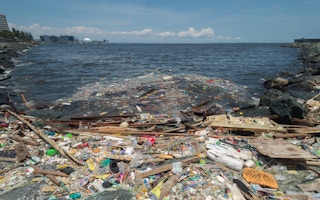Philippine president Rodrigo Duterte is considering a ban on single-use plastic in the country, his spokesperson has revealed.
To continue reading, subscribe to Eco‑Business.
There's something for everyone. We offer a range of subscription plans.
- Access our stories and receive our Insights Weekly newsletter with the free EB Member plan.
- Unlock unlimited access to our content and archive with EB Circle.
- Publish your content with EB Premium.
Salvador Panelo said Duterte floated the idea at a cabinet meeting on November 6 after the issue of climate change was raised, and officials from the government’s department of natural resources discussed the country’s chronic use of plastic.
The president proposed the idea as Natural Resources Development Corporation president and chief executive officer Vernice Victorio presented priority programmes for the environment and climate change resiliency during the meeting, Panelo said.
“The President floated the idea to ban the use of plastics which, according to him, would require legislative action,” Salvador Panelo said at a press briefing on Thursday.
An archipelago of more than 7,100 islands, the Philippines has been identified as the third-worst ocean plastic polluter in the world after China and Indonesia, accounting for 5.9 per cent of total plastic waste in the world’s seas, according to a global 2015 study .
A 2017 report by environment group, the Global Alliance for Incinerator Alternatives, also showed that Filipinos use more than 163 million plastic sachets, 48 million shopping bags and 45 million thin-film bags daily.
“
The President needs to certify as priority a strong national single-use plastic ban bill, which should aim for a drastic reduction of the manufacture of single-use plastic products and packaging, and their eventual elimination from the market.
Abigail Aguilar, regional campaign coordinator, Greenpeace Southeast Asia
With plastic waste reaching worrying proportions in the country, the news elicited praise from environmental watchdog Greenpeace, which called it a “long-delayed pronouncement”.
“We trust it will be put into action and will not remain a mere statement,” Abigail Aguilar, regional campaign coordinator at Greenpeace Southeast Asia, said.
Aguilar reiterated that the solution to the scourge of single-use plastics is to avoid its manufacture. She called on Duterte to prioritise a “strong national single-use plastic ban bill”, which should aim for a drastic reduction in the manufacture of single-use plastic products and packaging.
Legislators have already tried to stem the tide of plastic with several bills aimed at combating plastic pollution, including the proposed Ban on Single-use Plastic Products Act, but none of the measures are close to becoming law.
“The ban must include the phase-out of sachet packaging, direct companies to redesign products and packaging, and give incentives to reuse, refill and other alternative delivery systems,” Aguilar added.
“It should not include false solutions such as materials substitution to paper or bioplastics, lightweighting of packaging, and chemical recycling, among others.”
Greenpeace has previously called on major consumer goods manufacturers to tackle the root of the plastic problem by curbing its overuse.
“Commitments by corporations like Coca-Cola, Nestlé, and PepsiCo to address the crisis unfortunately continue to rely on false solutions like replacing plastic with paper or bioplastics and relying more heavily on a broken global recycling system,” Aguilar told the media recently.

















